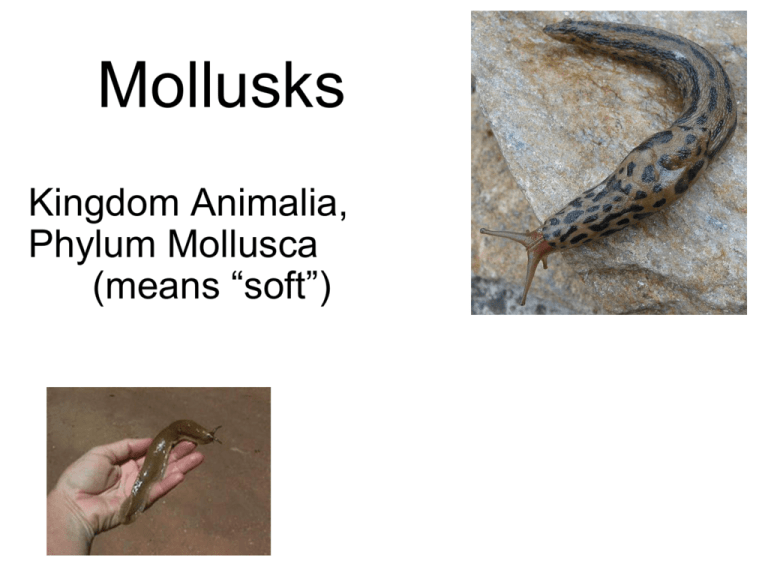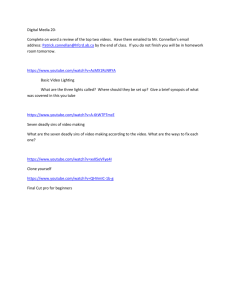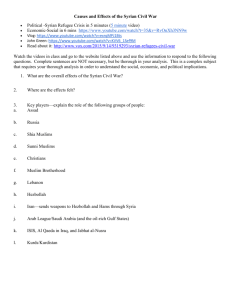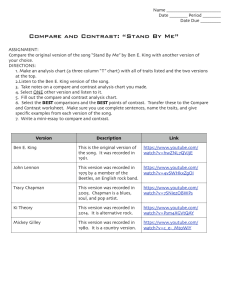Mollusks
advertisement

Mollusks Kingdom Animalia, Phylum Mollusca (means “soft”) What is a Mollusk? ● ● ● ● Mollusks are extremely diverse! Soft body with internal or external shell Ex: snails, slugs, clams, squids, and octopi Trochophore larva ●Bilaterally symmetrical. ● Has a nervous system with a circumoesophagal ring, ganglia and paired nerve chords. ● Has an open circulatory system with a heart and an aorta. ● Has gaseous exchange organs called ctenidial gills. ● Reproduce sexually ●Feed a wide range of material. ●Live in most environments. ●Despite their amazing diversity, all mollusks share some unique characteristics that define their body plan ● Body plan: ● ● ● ● Foot – takes on many forms Mantle – covers the body Shell – (present in most) Visceral mass – internal organs ●https://www.youtube.com/watch?v=ZGIQ2 sCgEmE Groups of Mollusks Three major classes of mollusks Gastropods Bivalves Cephalopods Gastropod ● ● ● ● snails, slugs, and nudibranchs Shell-less or single shelled Move by a muscular foot Some are poisonous, bright colors Snail Spiral Mouth (radula) ●https://www.youtube.com/watch?v=u4QAn CFd4iw ●https://www.youtube.com/watch?v=Go_LI z7kTok Slug ●https://www.youtube.com/watch?v=W9EV a8p5b58 Nudibranchs (sea slugs) Check out the nudibranch gallery at nationalgeographic ●https://www.youtube.com/watch?v=cJELPcwtP8 Bivalves (things with 2 shells) Such as clams, mussels, oysters, and scallops. Bivalves are found in both freshwater and marine environments. ●Burrowing Clam: https://www.youtube.com/watch?v=6JyNp PUj1ys ●Ask an Expert: mussels https://www.youtube.com/watch?v=eq6XO h_ML4M ●Pearls: https://www.youtube.com/watch?v=tIOSW AbUf74 Cephalopods ● ● ● ● ● ● ● octopi, squids, cuttlefish, and nautilus soft-bodied , head is attached to foot foot is divided into tentacles with sucking disks small internal shells or no shell at all Many release ink Well developed eyes most complex of the mollusks Octopus (creeps on tentacles) Octopus ●Active Predators ●Learn easily, including learning by observation of another octopus ●Problem solvers Octopus ●Fast swimmers, they can jet forward by expelling water through their mantles. And their soft bodies, with no internal or external skeleton, can squeeze into impossibly small cracks and crevices where predators can't follow. ●The amazing mimic octopuses are capable of changing their color body shape to mimic other animals Octopus ●Have beaklike jaws that can deliver a nasty bite, and venomous saliva, used mainly for subduing prey. ●They have been found to play with “toys” and have personalities ●They have blue blood!! Intro: https://www.youtube.com/watch?v=epbJi35lzEs Octopus versus Shark: https://www.youtube.com/v/p9A-oxUMAy8 Octopus escapes jar: https://www.youtube.com/v/PmDTtkZlMwM Octopus camouflage: https://www.youtube.com/v/PmDTtkZlMwM Octopus Houdini: https://www.youtube.com/watch?v=9yHIsQhVxGM Cuttlefish (the chameleon of the sea) ●https://www.youtube.com/v/2x-8v1mxpR0 ● ● ● Nautilus is only cephalopod with shell Squid have a modified shell called a pen Like the octopus, squids also have parrotlike beaks ●https://www.youtube.com/watch?v=PIheR Ycm6sI Squid ●Giant Squid Documentary: https://www.youtube.com/watch?v=Cs6Kq pZ1PIE ●Biology Corner ●HumanKind. AnimalKind. OneKind.




